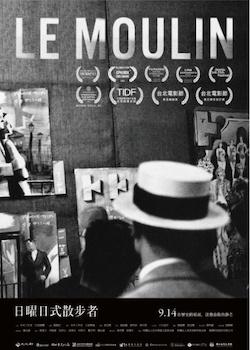Le Moulin

Directed by Huang Ya-li
Screened at the ICA in the Essay Film Festival
29 March 2017
Review by Roger Macy
There are all sorts of banners under which a Japanese film might be screened in the UK, and a recent banner was the Essay Film Festival, now in its third year in London. However, Le Moulin, might seem a strange choice for a Japan Society review – arriving under a French title in London, changed from its original Mandarin Chinese title. Nevertheless, the film’s language, apart from translations for the listener, was entirely Japanese and its subject was very much about Japanese culture.
Le Moulin comes from the name of a poetry society in Taiwan in the 1930s. Its authors, like most educated people in Taiwan at the time, wrote entirely in Japanese. This particular society wrapped itself in a modernist banner and tied itself overtly to metropolitan France. Its members continued to write and publish after wartime print restrictions closed Le Moulin. Abruptly in 1945, Japanese language was suppressed and a slice of Taiwanese cultural history became unavailable to subsequent generations, until recent scholarly interest.
Uncovering the unknown is, of course, the business of documentary film. But there are no known moving images of the members of Le Moulin, and this work is of a rarer genre – that of the poetry film.
Filmmaker Huang Ya-li has told his story entirely in the Japanese words of his subjects. Much of the 162 minutes of this film are devoted to the poetry. Most are narrated by a Japanese speaker, with written translations on screen in Mandarin and English. A few were presented in written Japanese, also with translations. But a story was told, because these members had also been vivid letter-writers, often reporting from Tokyo to their distant island.
Whilst the spoken word is the driving medium of the film, Huang manages to construct a film with some strong visual imagery. He is helped by many of the poems that use household objects as metaphors. These poets were of a modernist hue so Huang could relate their subjects to contemporary newsreel footage as, more easily, he could do with the letters.
Reaction to individual poems is a very personal thing and the combination of Huang’s aural and visual imagery that I liked might not, I accept, appeal to others. The combination of translations and imagery gave me a sense of understanding of the Japanese that would not be justified by my linguistic ability. I was helped further in this respect by a Hokkien-speaking maid, who has to learn Japanese in order to address her employing family in acceptable manner. I was offered a ladder up to the poetry, aided further by a recreated programme of ‘let’s practise Japanese’ on a made-believe radio.
The film has passages of recreated footage shot by Huang, some in Tokyo. It also has a post-war coda, when several of the members found themselves very much on the wrong end of the White Terror. Alas, with poetry and historic images for this period being unavailable, it makes for a bleak ending.
There’s very little more that I should or could say. In reviewing those other select members of the poetry-film genre, I can at least pull down the translated poem of, say, Tarkovsky’s father, write it down, and conjure up his son’s imagery in Mirror. But Le Moulin’s poems are still to be made readily available. It’s possible that the translation was part of the appeal for me, as it could equally be for Taiwanese Mandarin-speakers now: unlike the only book published so far which renders the poems into Mandarin without benefit of the originals, Huang makes a point of serving up a course of Taiwan’s linguistic history as it was spoken. This is all the more remarkable, as Huang is not a Japanese-speaker, but used collaborators. So, will the poems measure up to the ears and eyes of today’s speakers of Japanese? Fortunately, Huang is taking his film to Japan this summer so at least the topic can be opened to scrutiny.

